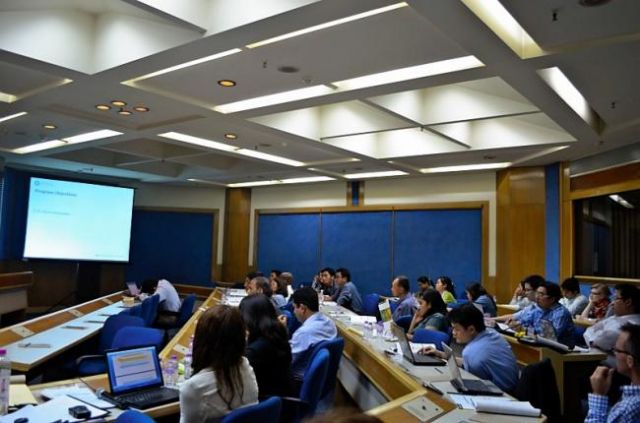
Title
By Stacy Kotorac and Kaleigh Robinson - June 12, 2012
This article was originally posted on the WRI blog, Insights.
Companies around the world are increasingly measuring and managing their greenhouse gas (GHG) emissions in response to drivers like consumer preference, purchaser demands, and sustainability goals. As a growing number of Asian companies look to manage their emissions, they’ll require training and resources available in their own languages and cultural contexts. To that end, the Greenhouse Gas Protocol recently held a week-long training session in Delhi, India to further build Asian companies’ capacities to measure and curb emissions.
Training participants included government representatives, business and industry council leaders, and NGOs from India, Indonesia, Malaysia, Nepal, the Philippines, Thailand, and Vietnam. The workshop focused on providing those in the region with tools to teach companies how to develop GHG inventories based on the GHG Protocol Corporate Standard and establish programs to measure and report their emissions. The Program Design Course provided a forum for participants to share experiences and future plans, and identified the steps involved in designing a blueprint to establish their own programs. The course drew on case studies from existing corporate GHG reporting programs like the Brazil GHG Protocol Program, the Mexico Greenhouse Gas Program, the Israel Voluntary Greenhouse Gas Registry, and the former U.S. EPA Climate Leaders Program, all of which are based on the GHG Protocol.
Protocol Corporate Standard provides guidance for companies around the world to quantify and report their emissions. Around 60 percent of Global Fortune 500 companies use the GHG Protocol to measure and manage their emissions.
Driving Corporate Climate Action in Asia
Upon conclusion of the training, several organizations announced plans to advance corporate action on climate change in their countries:
-
India: The Energy and Resources Institute (TERI) and its Business Council for Sustainable Development (BCSD) are partnering with WRI, including our local affiliate the India Resources Trust, to establish a voluntary, economy-wide GHG measurement and reporting program for local businesses in India. The program will build capacity of local businesses to account for corporate and facility-level GHG emissions based on GHG Protocol methodologies and best practices. "The overall vision of this program is to develop a ‘Centre of Excellence’ on GHG emissions accounting and build a foundation for future climate policies,” said Dr. Arabinda Mishra, director of TERI’s Earth Science and Climate Change Division. “The program's focus will be on capacity-building, creating a culture of corporate GHG inventories, and building the knowledge base for developing credible corporate inventories in the country."
-
Indonesia: Prior to the workshop, the Indonesian Business Council for Sustainable Development (IBCSD) and the Indonesian Chamber of Commerce and Industry (KADIN) had already begun planning a voluntary corporate GHG reporting program. They noted that completing the GHG Protocol training will help them as they finalize the strategy and move toward implementation. “The GHG Protocol Training has helped the IBCSD and KADIN to formulate a concrete plan to help meet Indonesia’s emission reduction target,” said Tiur Rumondang of the IBCSD. “IBCSD’s member companies agree on the importance of GHG accounting for businesses from the point of view of both increased profitability and sustainability. Voluntary reporting from companies is now perceived as an opportunity to launch a bottom-up approach towards a government-endorsed GHG reporting program that could be implemented nationwide.”
-
Malaysia: The Business Council for Sustainability and Responsibility Malaysia plans to initiate a voluntary corporate GHG reporting pilot program among member companies, with input from the government. The program will support Malaysia's national voluntary goal of reducing emissions intensity of GDP by up to 40 percent below 2005 levels by 2020.
-
Philippines: Philippines Businesses for the Environment and the Ateneo School of Government announced they would schedule a planning workshop in late spring to develop a national GHG reporting program. They are currently engaged in discussions with government agencies to institutionalize the program and with potential private-sector partners that may help with inventory quality and verification. Efforts are also ongoing to promote the GHG Protocol Corporate Standard among Philippine companies.
-
Thailand: The Thailand Greenhouse Gas Management Organization (TGO) has already established a Product Carbon Footprint Program and is piloting its Carbon Footprint Guidelines within the public and private sectors. Since attending the GHG Protocol training, TGO plans to closely collaborate with Chiang Mai University to expand its capacity-building program to include corporate-level GHG measurement.
-
Vietnam: The Vietnamese Institute of Meteorology, Hydrology and the Environment will share what it learned with members of the Vietnamese government and explore the possibility of establishing a voluntary corporate GHG reporting program.
Further Collaboration and Training
The GHG Protocol team is pleased by the process in Asian countries and excited to continue collaborating with workshop participants to establish new corporate reporting programs and help them provide training for companies in their countries. In addition, the GHG Protocol Training and Capacity Building Project is moving forward in offering online courses. We will be offering our first full online webinar course on the Corporate Standard from July 24-26. Over the coming months, we will hold further training on the new Corporate Value Chain (Scope 3) and Product Life Cycle Accounting and Reporting Standards. These trainings and the new country initiatives will continue building Asia’s capacity for corporate action on curbing climate change.
Photo credit: WRI